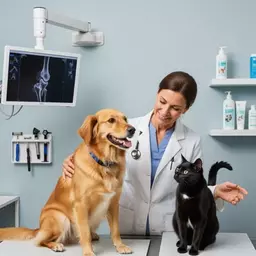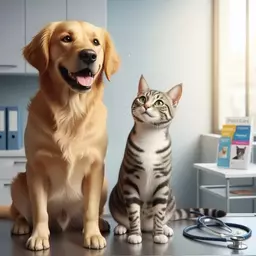What if the future of your pet's health was just a click away? With advancements in veterinary medicine, staying informed has never been more crucial. As we look toward 2025, innovations in animal care are transforming how we connect with and care for our furry companions.
What You Will Learn
- Telehealth services are revolutionizing access to veterinary care, making consultations more convenient than ever.
- Artificial intelligence is enhancing diagnostic accuracy, allowing for quicker and more reliable results.
- Wearable technology enables real-time health monitoring of pets, promoting proactive health management.
- Innovative treatments such as regenerative medicine are changing traditional care approaches for better outcomes.
- Personalized nutrition plans cater to individual pet needs, ensuring optimized health and well-being.
Innovations Shaping Veterinary Care by 2025
The veterinary medicine landscape is undergoing a significant transformation. Key innovations are improving animal health and clinical practices, making care more accessible and efficient for both pet owners and professionals alike.
Telemedicine & Telehealth
Revolutionizing access to care, offering remote consultations and reducing pet stress.
AI in Diagnostics
Enhancing diagnostic accuracy for quicker and more precise treatment results.
Wearable Technology
Enabling continuous real-time health monitoring for proactive pet management.
Regenerative Medicine
Transforming traditional care with innovative treatments for various conditions.
Understanding the Future of Veterinary Medicine Innovations in 2025
As we look ahead to 2025, the landscape of veterinary medicine is poised for incredible transformation. Innovations are not just on the horizon; they are already reshaping how we think about animal care. It's essential for both pet owners and veterinary professionals to stay abreast of these trends, as they hold the key to a healthier future for our beloved companions. For a deeper dive into the economic state of the veterinary profession, including trends and opportunities, you can refer to insights from dvm360's 2025 economic outlook.
By understanding the critical trends in veterinary medicine, we can better prepare for advancements that enhance animal health and streamline clinical practices. This isn't just about keeping up; it's about being proactive in the well-being of our pets and the efficiency of veterinary practices.
What Are the Key Veterinary Medicine Trends to Anticipate?
- Telemedicine and telehealth services that improve access to veterinary care
- Artificial intelligence tools that enhance diagnostic accuracy
- Wearable technology for pets that monitors health in real-time
- Innovative treatment approaches like regenerative medicine
- Personalized nutrition tailored to individual pet needs
These trends not only represent a shift in treatment methodologies but also an evolution in how we engage with pet care. By embracing these innovations, we can ensure more effective communication and care for our furry friends.
Significance of Staying Ahead with Veterinary Innovations
Being informed about emerging technologies in veterinary medicine is vital. Staying ahead helps foster better relationships between pet owners and veterinarians, enhancing the overall experience for everyone involved. At VetInfo World, we believe that knowledge is power, and by educating ourselves, we can provide our pets with the highest standard of care.
Moreover, adapting to these innovations can lead to improved efficiency in practice management, allowing veterinary professionals to focus more on their patients and less on administrative tasks. This shift ultimately benefits not just the clinics but also the pets who receive care.
Transformative Technologies Shaping Animal Care
As transformative technologies continue to evolve, their impact on animal care becomes increasingly profound. From telehealth to artificial intelligence, we’re witnessing a revolution in how veterinary services are delivered. These advancements allow us to provide better care while improving accessibility for pet owners. Current efforts to address challenges like veterinary shortages, particularly in rural areas, highlight the growing need for innovative solutions; the USDA has announced plans to address these issues, emphasizing the importance of expanding access to care.
One such innovation is telemedicine, which has made it possible for pet owners to consult with veterinarians without the stress of a clinic visit. This is particularly beneficial for those with busy schedules or pets that experience anxiety in unfamiliar environments.
Telemedicine and Telehealth: Revolutionizing Access to Care
How Telehealth Services Improve Veterinary Consultations
Telehealth services have become a game changer in veterinary medicine. They provide a platform for remote consultations, enabling pet owners to receive advice on minor health issues quickly. This not only saves time but also promotes timely treatment, which can be crucial for the health of pets.
- Convenient access to veterinary expertise without travel
- Reduced stress for pets who may be uncomfortable in a clinic setting
- Increased capacity for veterinarians to see more patients efficiently
By leveraging these services, we can enhance communication and ensure that pet owners feel supported in their care journey. It’s an exciting time to be involved in veterinary medicine!
The Role of Mobile Veterinary Clinics in Enhancing Access
Mobile veterinary clinics are another innovative solution that extends veterinary care into communities. These clinics bring services directly to pet owners, offering convenience and access where traditional clinics may be scarce. Imagine the ease of having your pet’s vaccinations or check-ups done right in your neighborhood!
Mobile clinics can serve rural areas effectively, ensuring that no pet is left without proper care. They also play a crucial role in emergency situations where immediate attention is needed. For more information on the demand for and supply of veterinarians, including workforce projections, a comprehensive report from the AAVMC provides valuable insights.
We Want to Hear From You!
As we explore the future of veterinary medicine, we’d love to know your thoughts! How do you feel about the role of technology in your pet's healthcare? Share your opinions below:
Frequently Asked Questions About Veterinary Innovations in 2025
- Q: What are the main innovations expected in veterinary medicine by 2025?
- A: Key innovations include telemedicine and telehealth services, artificial intelligence (AI) in diagnostics, wearable technology for pets, regenerative medicine, and personalized nutrition plans.
- Q: How will telehealth services benefit pet owners and veterinarians?
- A: Telehealth provides convenient access to veterinary expertise, reduces stress for pets uncomfortable in clinic settings, and increases veterinarians' capacity to see more patients efficiently through remote consultations.
- Q: What role does AI play in the future of pet diagnostics?
- A: AI enhances diagnostic accuracy, leading to quicker and more precise treatment results for various conditions.
- Q: How can wearable technology help in managing pet health?
- A: Wearable technology enables continuous, real-time health monitoring of pets, allowing for proactive health management and early detection of potential issues.
- Q: What is regenerative medicine, and how is it transforming traditional pet care?
- A: Regenerative medicine involves innovative treatments that aim to repair or replace damaged tissues and organs, transforming traditional care approaches with therapies that can improve outcomes for various conditions.
- Q: Why is personalized nutrition becoming important for pets?
- A: Personalized nutrition plans are tailored to individual pet needs, ensuring optimized health and well-being by addressing specific dietary requirements and health conditions.
Summary of Veterinary Medicine Innovations and Their Impact
As we step into 2025, the landscape of veterinary medicine is rapidly transforming. The innovations we've explored are not just trends; they represent a paradigm shift in how we approach animal care. From advanced diagnostics powered by artificial intelligence to the rise of telemedicine, these changes are designed to enhance the well-being of our pets while making veterinary care more accessible and efficient. Understanding these developments is crucial for both veterinary professionals and pet owners alike.
In summary, here are the key trends to watch in veterinary medicine:
- Telehealth services providing easier access to veterinary consultations.
- The use of AI in diagnostics for quicker and more accurate results.
- Wearable technology allowing for continuous health monitoring of pets.
- Innovative treatments like regenerative medicine transforming traditional care methods.
- Customized nutrition plans that cater to individual health needs.
By remaining informed about these innovations, we can better support the health and happiness of our furry companions!
Key Takeaways on the Trends to Watch in 2025
The future of veterinary care hinges on embracing these emerging trends. Whether you're a practitioner or a pet owner, it's essential to stay ahead of the curve. Here are the main takeaways:
- Embrace technology: Tools like telemedicine and diagnostics will redefine our approach to pet health.
- Prioritize preventive care: Incorporating technology into regular check-ups can lead to earlier interventions.
- Focus on education: Both clients and veterinarians must understand and leverage these innovations for the best outcomes.
Staying informed will ensure we all play an active role in improving our pets' health and quality of life.
Engaging Pet Owners in the Future of Veterinary Care
As a veterinarian, I believe that educating pet owners about new technologies is paramount. With innovations moving at a rapid pace, it's my mission at VetInfo World to bridge the gap between these advancements and pet owners' understanding. By engaging with clients and sharing knowledge about these tools, we can foster a collaborative approach to pet health.
Educating Clients on the Value of New Technologies
Clients can greatly benefit from embracing the new technologies available in veterinary medicine. Here are some ways they can enhance their pets' care:
- Utilizing telehealth: Pet owners can consult with veterinarians without the stress of a clinic visit.
- Monitoring health: Wearable devices provide real-time data, enabling proactive health management.
- Understanding diagnostics: Knowing how AI enhances diagnostic accuracy can lead to better treatment decisions.
By educating clients on these benefits, we help them become proactive participants in their pets' health journeys.
Looking Ahead: The Future of Animal Care and Veterinary Practices
As we look forward, encouraging conversations about change in veterinary medicine is vital. It's not just about technological advancements; it's about how we adapt and communicate those changes. Engaging in discussions about the potential impacts of these innovations can empower pet owners and inspire confidence in the care their animals receive.
Encouraging Conversations About Change in Veterinary Medicine
These conversations can lead to a deeper understanding of the innovations that shape our practices. I encourage pet owners to ask questions and seek clarification on new methods and treatments. This dialogue is crucial for building trust and ensuring that everyone is on the same page regarding their pets' health.
The Role of Veterinary Partnerships in Advancing Animal Health
Finally, forging strong partnerships within the veterinary community will enhance our ability to advance animal health. Collaborations between veterinary professionals, researchers, and pet owners will pave the way for even more innovative solutions. Together, we can ensure that our furry friends receive the best possible care in this ever-evolving landscape!
Recap of Key Points
Here is a quick recap of the important points discussed in the article:
- Telehealth services: Provide easier access to veterinary consultations, reducing stress for pets and owners.
- AI in diagnostics: Enhances diagnostic accuracy for quicker and more effective treatment decisions.
- Wearable technology: Allows for continuous health monitoring of pets, promoting proactive health management.
- Innovative treatments: Regenerative medicine is transforming traditional care methods and improving outcomes.
- Customized nutrition: Tailors dietary plans to individual pet needs, enhancing overall health.








